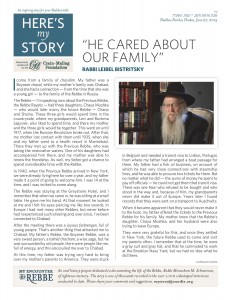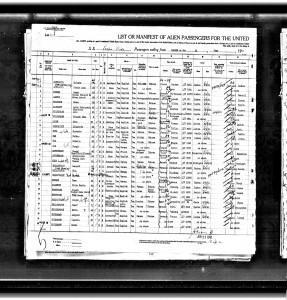He Cared About Our Family
I come from a family of chasidim. My father was a Boyaner chasid, while my mother’s family was Chabad, and she had a connection – from the time that she was a young girl – to the family of the Rebbe in Russia.
The Rebbe – I’m speaking now about the Previous Rebbe, the Rebbe Rayatz – had three daughters, Chaya Mushka – who would later marry the future Rebbe – Chana and Shaina. These three girls would spend time in the countryside, where my grandparents, Levi and Rochma Lagovier, also liked to spend time, and there my mother and the three girls would be together. This went on until 1917, when the Russian Revolution broke out. After that, my mother lost contact with them until 1935, when she and my father went to a health resort in Marienbad. There they met up with the Previous Rebbe, who was taking the restorative waters. One of his daughters had accompanied him there, and my mother was able to renew the friendship. As well, my father got a chance to spend considerable time with the Rebbe.
In 1940, when the Previous Rebbe arrived in New York, we were already living here for over a year, and my father made it a point of going to welcome him. I was 14 at the time, and I was invited to come along.
The Rebbe was staying at the Greystone Hotel, and I remember that when we came in, he was sitting at a small table. He gave me his hand. At that moment he looked at me and I felt his eyes piercing me like two swords. In Europe I had met many other Rebbes, but never before had I experienced such a feeling and, ever since, I’ve been connected to Chabad.
After the meeting there was a joyous farbrengen, full of young people. That’s another thing that attracted me to Chabad. My father’s Rebbe, the Boyaner Rebbe, was a very sweet person, a talmid chacham, a wise sage, but he was surrounded by old people. Here were people like me, full of energy, and this also pulled me over to Chabad.
At this time, my father was trying very hard to bring over my mother’s parents to America. They were stuck in Belgium and needed a transit visa to Lisbon, Portugal, from where my father had arranged a boat passage for them. My father had a fish oil business, on account of which he had very close connections with steamship lines, and he was able to procure two tickets for them. But no matter what he did – the sums of money he spent to pay off officials – he could not get them that transit visa. There was one Nazi who refused to be bought and who stood in the way and, because of him, my grandparents never did make it out of Europe. Years later I found records that they were sent on a transport to Auschwitz.
When it became apparent that they would never make it to the boat, my father offered the tickets to the Previous Rebbe for his family. From my mother he knew that the Rebbe’s daughter, Chaya Mushka, and her husband were also trying to leave Europe.
They were very grateful for this, and once they settled in New York, the future Rebbe used to come and visit my parents often. I remember that at this time, he wore a gray suit and gray hat, and that he commuted to work at the Brooklyn Navy Yard, but what he was doing there we had no idea.
After work at the Navy Yard, he would come to Chabad Headquarters and continue to work there. He was in charge of the educational and social services arms of Chabad – Merkos L’Inyonei Chinuch and Machne Israel. He was also in charge of the Kehot Publishing Society, Chabad’s publishing division. He was very busy disseminating chasidic literature – like the discourses of the Rebbe Maharash – and he was involved in every aspect of the printing and production.
I was a student in the Chabad yeshiva then, so I used to see him at work, and I would talk to him often.
When the Previous Rebbe passed away, I was sure he would be the successor. There was just something so special about him. While it was obvious to everyone that he was a brilliant scholar, to me what most stood out about him was his modesty and humility. And I’d like to give a couple example of how real and unassuming he was.
In 1954, I moved with my wife and kids to Vineland, New Jersey, and became a chicken farmer, but I used to come into New York often. On this particular occasion, I had parked my truck on Kingston Avenue, leaving my wife and children inside, and I went into a store to buy milk and bread. Just then, my wife spotted the Rebbe walking down the street, obviously coming from his mother’s house on the corner of Kingston and President, heading to Chabad Headquarters. The Rebbe also spotted her and came over. He stepped right into the back of the truck – it was a kind of step-in van – and he began speaking to my wife, asking her about our livelihood and so forth. Then he started playing with the kids.
Meanwhile, somebody ran into the store and said to me, “The Rebbe has climbed into a blue truck! Is that your truck?” I came outside and stood staring in wonder. Then he saluted the kids and went on his way.
I felt that he cared about our family and went out of his way to find out how we were doing. The truth was, the chicken business was not going well. In fact, at some point it got so bad that the marshal was coming to my door to collect money. I couldn’t take it anymore, and I decided to go see the Rebbe about it. I wrote up the details of my predicament with a broken heart, explaining my troubles and begging for his blessing.
The Rebbe read my whole letter and said, “Leibel, G-d will help you.” This was reassurance, but it was not enough for me. “Rebbe,” I pleaded with tears in my eyes, “doesn’t it say in the Talmud, tzaddik gozer v’Hakadosh Baruch Hu mekayem – when a righteous person makes a decree, G-d carries it out.”
Again, the Rebbe said, “G-d will help you,” but I couldn’t hear it. By then I was sobbing and insisting, “I will not leave here until the Rebbe issues a decree.”
He looked at me and, seeing my despair, finally said, “It should be as you say.”
What happened in the end? I didn’t find a lottery ticket, I didn’t find a million dollars in the street. But, bit by bit, I clawed my way out of the hole, and I became successful. It took a long time; my wife and I slaved for many years until I was able to stand on my own two feet. But I can say this: With the passing years, we saw the Rebbe’s blessing fulfilled.
Rabbi Leibel Bistritzky was the proprietor of a kosher food store on Manhattan’s Lower East Side, and an early pioneer of the medical emergency volunteer response organization Hatzalah. He passed away in 2013 at age 86. He was interviewed once in 2005 and again in 2006.







No Comments to “He Cared About Our Family”